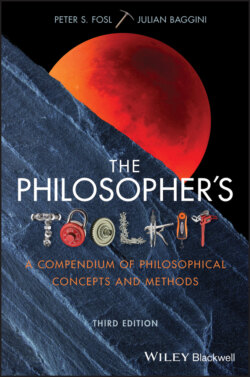Читать книгу The Philosopher's Toolkit - Julian Baggini, Julian Baggini - Страница 72
1.10 Definitions
ОглавлениеIf, somewhere, there lie written on tablets of stone the ten philosophical commandments, you can be sure that numbered among them is the injunction to ‘define your terms’. In fact, definitions are so important in philosophy that some have maintained that definitions are ultimately all there is to the subject.
Definitions are important because without them, it’s very easy to argue at cross‐purposes or to commit fallacies involving equivocation (3.3). As the experience of attorneys who questioned former US president Bill Clinton show, if you are, for example, to interrogate someone about extramarital sex, you need to define what precisely you mean by ‘sex’. Otherwise, much argument down the line, you can bet someone will turn around and say, ‘Oh, well, I wasn’t counting that as sex’. Much of our language is vague and ambiguous, but if we are to discuss matters in as precise a way as possible, as philosophy aims to do, we should remove as much vagueness and ambiguity as possible, and adequate definitions are the perfect tool for helping us do that.
